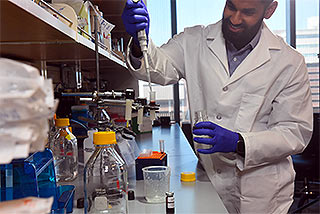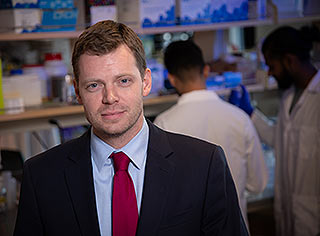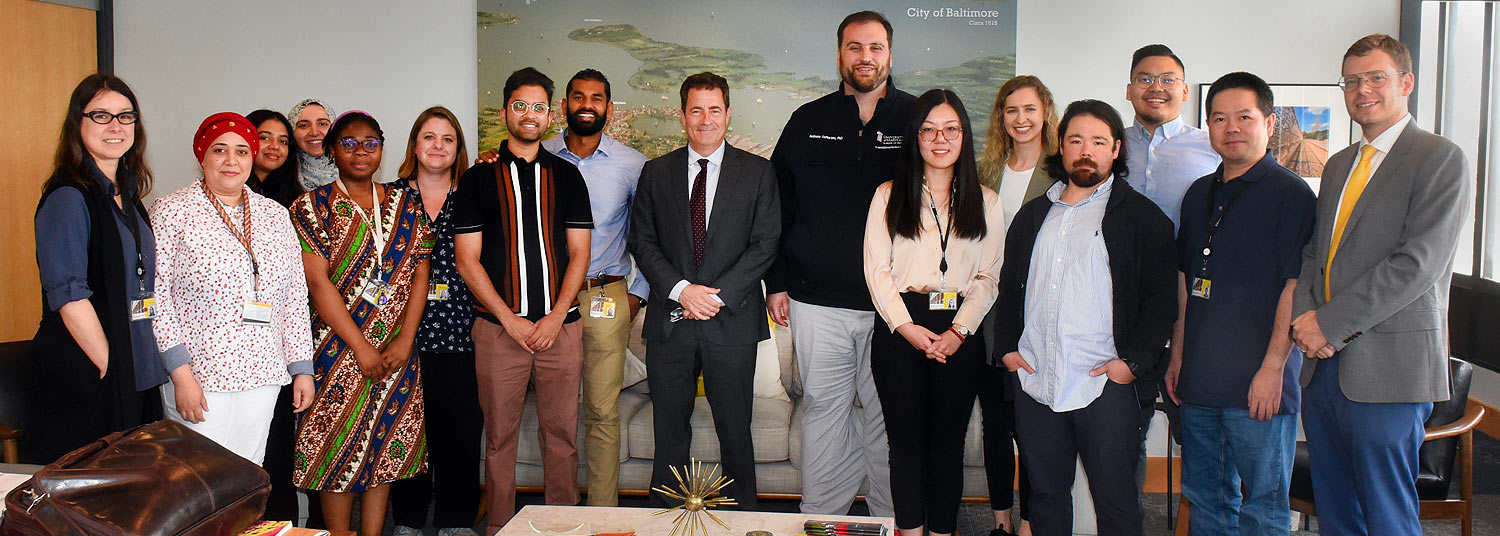 What is translational redox medicine?
What is translational redox medicine?
Translational redox medicine is a type of ‘benchtop to bedside’ biomedical research that specifically focuses on disease states and/or treatments that involve a reductive or oxidative (“redox”) change in their respective biochemical mechanism of action. As such, the biomedical research of this laboratory focuses on blood and vascular tissues, where key ‘redox sensitive’ hemoproteins largely appear, and abnormal changes in the redox status of these hemoproteins are hallmarks of many vascular and pulmonary disease states, several of which are highlighted below in our teams’ work.
Lab Leadership
 Our team is guided by Dean Mark Gladwin, MD – Professor of Medicine, the Director of the Laboratory of Translational Redox Medicine. Dr. Gladwin’s discoveries include inorganic nitrite biological signaling, which regulates physiological and pathological hypoxic responses, blood pressure and flow, and dynamic mitochondrial electron transport. He has also characterized the role of hemoglobin and myoglobin as signaling nitrite reductases that regulate NO production under hypoxia, and his 2003 publication on this work has been cited >1,800 times and is in Nature Medicine’s Classic Collection. His work on nitrite has led to the development and licensing of intravenous, oral, and inhaled nitrite as a human therapeutic, with completion of animal toxicology, GMP formulations and phase Ia and Ib clinical trials, including licensing of the drug. Phase II trials of inhaled nitrite are now underway for the treatment of pulmonary arterial hypertension, metabolic syndrome, and heart failure with preserved ejection fraction. He has also characterized a novel mechanism of disease, hemolysis-associated endothelial dysfunction, which describes resistance to NO induced vasodilation in patients with sickle cell disease, malaria, aged blood transfusions, and other hemolytic conditions. These studies translated to clinical and epidemiological description of a human disease syndrome, hemolysis-associated pulmonary hypertension. Our multidisciplinary team also study genes that specifically influence blood storage and transfusion outcomes, the function of cellular globins in embryonic development, and the proliferation-maturation interplay mechanism in adult cardiomyocytes.
Our team is guided by Dean Mark Gladwin, MD – Professor of Medicine, the Director of the Laboratory of Translational Redox Medicine. Dr. Gladwin’s discoveries include inorganic nitrite biological signaling, which regulates physiological and pathological hypoxic responses, blood pressure and flow, and dynamic mitochondrial electron transport. He has also characterized the role of hemoglobin and myoglobin as signaling nitrite reductases that regulate NO production under hypoxia, and his 2003 publication on this work has been cited >1,800 times and is in Nature Medicine’s Classic Collection. His work on nitrite has led to the development and licensing of intravenous, oral, and inhaled nitrite as a human therapeutic, with completion of animal toxicology, GMP formulations and phase Ia and Ib clinical trials, including licensing of the drug. Phase II trials of inhaled nitrite are now underway for the treatment of pulmonary arterial hypertension, metabolic syndrome, and heart failure with preserved ejection fraction. He has also characterized a novel mechanism of disease, hemolysis-associated endothelial dysfunction, which describes resistance to NO induced vasodilation in patients with sickle cell disease, malaria, aged blood transfusions, and other hemolytic conditions. These studies translated to clinical and epidemiological description of a human disease syndrome, hemolysis-associated pulmonary hypertension. Our multidisciplinary team also study genes that specifically influence blood storage and transfusion outcomes, the function of cellular globins in embryonic development, and the proliferation-maturation interplay mechanism in adult cardiomyocytes.
 Established in 2022 at the University of Maryland School of Medicine, the Laboratory of Translational Redox Medicine consists of several sections with focus on vascular biology and redox chemistry as they relate to pulmonary, hematologic, and cardiovascular disease. Led by multiple principal investigators, the different sections are highlighted here.
Established in 2022 at the University of Maryland School of Medicine, the Laboratory of Translational Redox Medicine consists of several sections with focus on vascular biology and redox chemistry as they relate to pulmonary, hematologic, and cardiovascular disease. Led by multiple principal investigators, the different sections are highlighted here.
- Inhalational Toxicology and Resuscitation
- Nitric Oxide and Heme Biochemistry
- Red Cell Integrity and Genetics
- Cellular Globins
- Cardiovascular Tissue Homeostasis
Jason J. Rose, MD, MBA, current Associate Dean for Innovation and Physician Science Development and Chief of Pulmonary, Critical Care, and Sleep Medicine has served as a managing director of the allied group focused on administrative duties and scientific operations. Since moving from the University of Pittsburgh, the group has been highly successful in obtaining extramural funding , making novel discoveries, and developing innovative technologies. We are passionate about training the next generation of scientists and physician scientists. We are proud to have developed many trainees from around the world towards successful academic and scientific careers.
Please email John Hwang, the Laboratory Manager, for inquiries and interest in joining our team.

